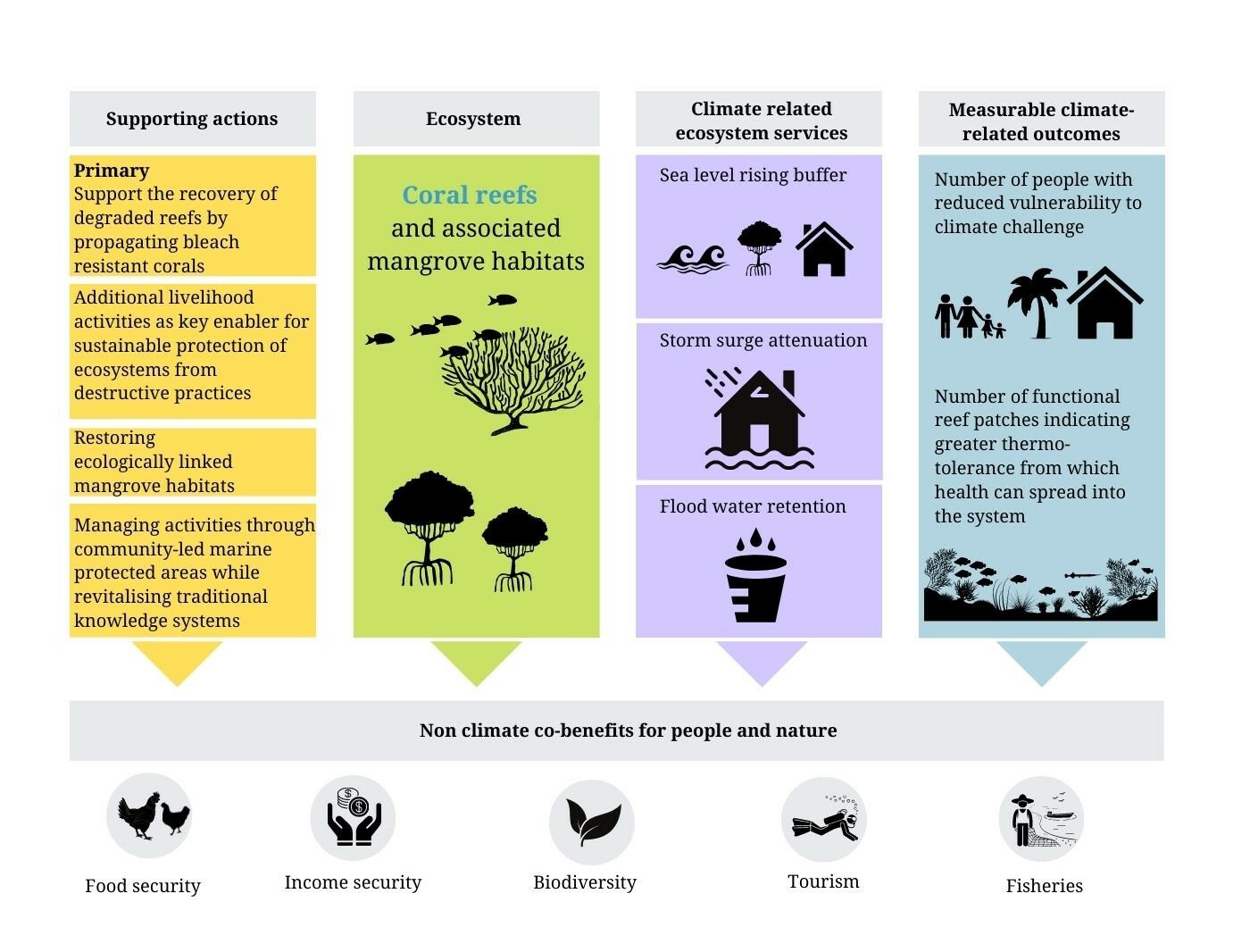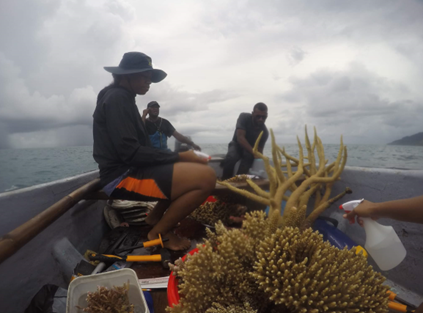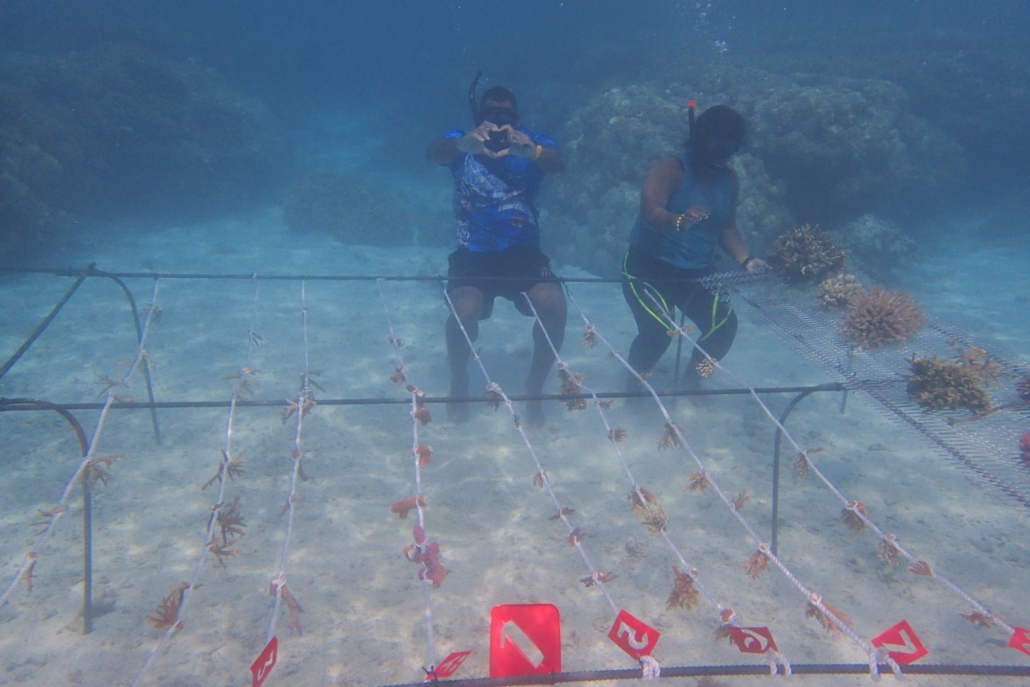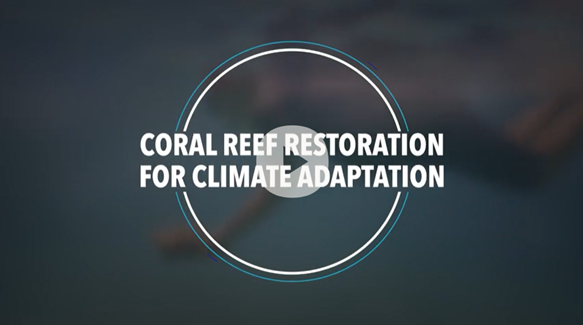Reflecting on a community-led nature based-solution to
support survival of coral reefs in the face of climate change.
In June 2022 Kyeema embarked upon Australia-Pacific Nature-based Solutions Challenge with partners Corals for Conservation and Just World Partnerships. This multi-million dollar challenge fund supports Australian NGO Cooperation Program accredited organisations, like Kyeema, and their partners in the Pacific to pilot and expand promising and emerging nature-based solutions.
We are supporting young Indigenous scientists, community leaders, and frontline Ministry staff from Pacific Island countries, to help save compromised reef ecosystems. Healthy reefs will reduce the vulnerability of coastal communities to climate-related shocks like marine heat waves, rising sea levels, storm surges and coastal erosion. Indigenous scientists from Fiji, PNG Samoa are tasked with identifying bleaching resistant corals, and cultivating them in test nurseries for reintroduction into local reef out planting sites in the coming years. In addition community leaders in Yule Island (PNG) and Motoriki Island (Fiji) will support establishment of community-led coral reef restoration sites, alongside mangrove restoration and livelihoods activities such as village chicken keeping. The establishment of low input village birds serve as an alternative protein and income source in communities whilst fish stocks recover in restoration sites.
The model for Nature based Solution we are piloting in 2022-23 with funding from the Climate Resilient by Nature initiative of the Australian Government in partnership with World Wildlife Fund Australia.
In the first six months of the project a total of 215 people representing 7 communities have been directly engaged in the project across PNG, Fiji and Samoa. This has included training for 19 marine scientists (12 women and 6 youth) in coral reef restoration. Support, guidance, and seed funding has been released to groups of these trained coral reef champions to establish six test nursery sites (2 Fiji, 2 Samoa, 2 PNG) that are planned to establish evidence for the thermotolerance of genotypes and species from inshore hot pocket reefs. These efforts are incredibly timely given the extant threat from soaring water temperatures over the summer of 2022-23; not ideal conditions for re-locating corals and setting up experiments to test their thermal tolerance. Despite this, three test nursery sites have been established (2 in Fiji and 1 in PNG). The remainder of the sites are planned for set up in the forthcoming quarter once average summer sea temperatures have dropped below 29 degrees.
Arovudi team and helpers setting up their test nursery site, Fiji.
Treasure Island team setting up their test nursery site, Fiji.
The key to sustainability of reefs is building community and Customary Owner understanding of their importance and principles for care. Baseline community consultations have been undertaken with 56 men, women and youth across 4 villages in Yule Island and Motoriki Island. Communities have agreed on the key activities for the NbS to go forward including coral reef restoration, mangrove planting and improved village chicken keeping and Motoriki communities have planned for two Marine Protected Areas to be established. A Master village chicken farm has been set up in Yule Island and 6 community leaders (5 women and 3 youth) have been chosen to attend the community training planned for May 2023 in Fiji. A coral reef restoration site (with two nursery patches) has been established in Yule Island also, with the LMMA around it yet to be officially agreed upon. Support for mangrove restoration activities for Yule Island have also been initiated with the existing Women in Mangrove Management (WIMMA) group in Poukama.
In the hope of scaling this citizen science approach for Pacific community coral reefs, we have produced a four-part training video series on ‘Coral Reef Restoration for Climate Action’ that will be launched in 2023. We are interested in reaching out to personnel and networks from Vanuatu, Tuvalu and Kiribati and any other Pacific Island Country members interested in learning about implementing this work.
If you are interested in attending this online training launch event.
Please contact Carl Ume: carlu@kyeemafoundation.org
Climate Resilient by Nature (CRxN) is an Australian Government initiative in partnership with WWF-Australia, advancing equitable nature-based solutions to climate change in the Indo-Pacific. CRxN supports projects that work with communities to restore and protect critical ecosystems, build sustainable livelihoods, and increase resilience to climate shocks.






